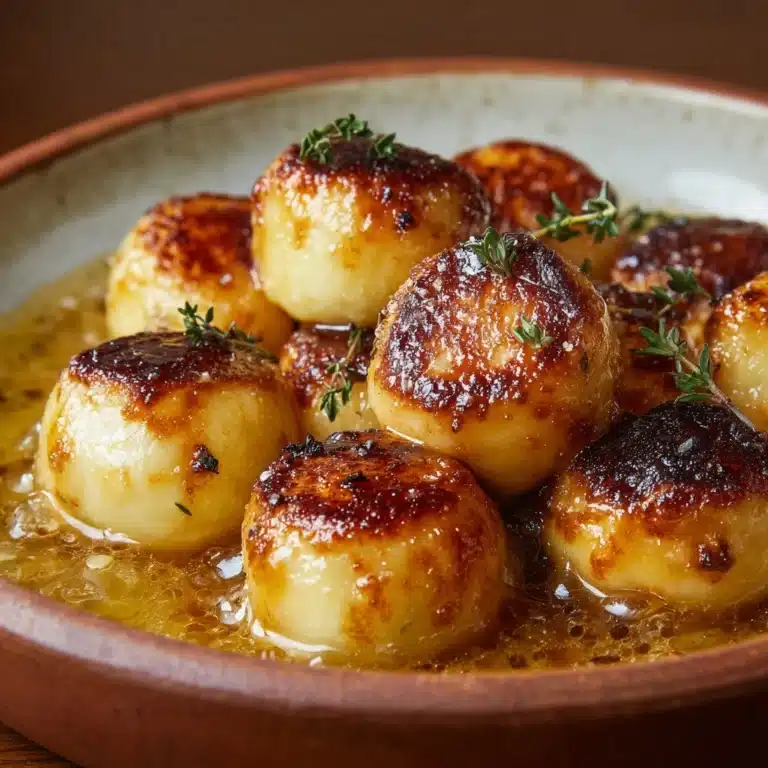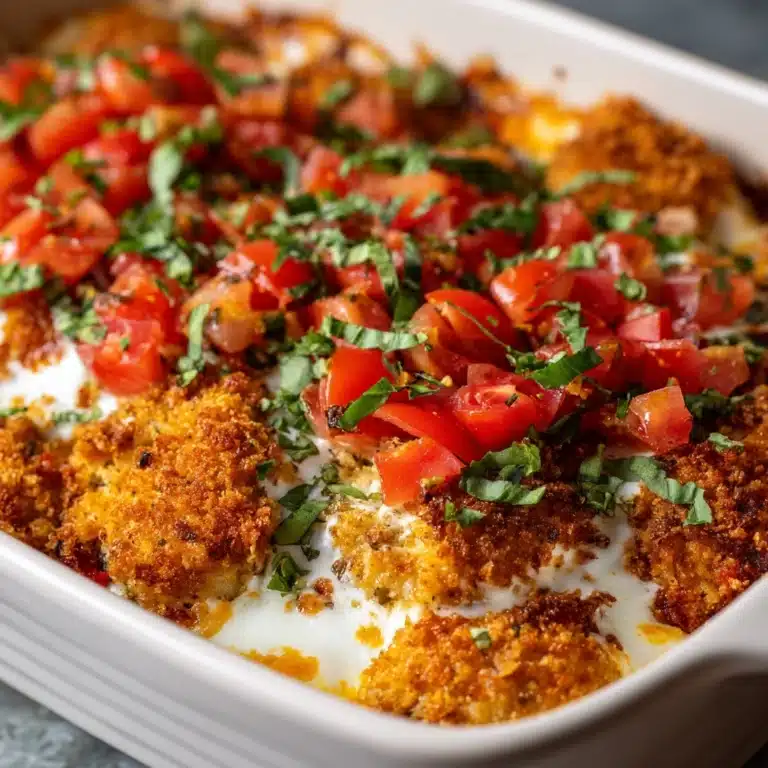Turkish Eggs Recipe
If you’ve never tried Turkish Eggs, prepare to fall in love with a breakfast that’s both comforting and sophisticated. This vibrant dish features creamy, garlicky yogurt, perfectly poached eggs, and a generous drizzle of spiced butter, all crowned with fresh herbs and served alongside crusty bread. It’s a gorgeous, flavor-packed way to start your day, offering a delightful blend of textures and colors that make every bite irresistible. Whether you’re cooking for brunch guests or treating yourself to something special, Turkish Eggs is a recipe that instantly feels like a new classic.

Ingredients You’ll Need
Turkish Eggs come together with just a handful of everyday ingredients, but each one is important for creating the signature taste and stunning appearance. Don’t skip or swap unnecessarily – every component plays a delicious role in the final dish!
- Large eggs: The stars of the show! Fresh eggs will give you the best poached texture and beautiful runny yolks.
- Greek yogurt: Choose plain, full-fat Greek yogurt for that rich, tangy base that anchors the whole dish.
- Garlic: Just a little goes a long way, infusing the yogurt with savory warmth.
- Unsalted butter: Melting this with olive oil creates the most heavenly, glossy drizzle.
- Olive oil: Blends with butter for a silkier sauce and a hint of fruity flavor.
- Aleppo pepper: This Turkish staple offers mild heat and a touch of smokiness; if you can’t find it, a mix of paprika and red pepper flakes works well.
- Salt: Essential for seasoning both the yogurt and the eggs, bringing all the flavors together.
- Fresh dill or parsley: Chopped herbs add a burst of color, freshness, and a pop of flavor on top.
- Crusty bread: Ideal for scooping up every bit of yogurty, eggy, buttery goodness.
How to Make Turkish Eggs
Step 1: Prepare the Garlicky Yogurt
Start by combining the Greek yogurt with the finely grated garlic and a pinch of salt in a small bowl. Give it a good stir, then set it aside on the counter. Allowing it to sit at room temperature takes the chill off and helps the garlic mellow, creating a creamy, savory bed for your eggs.
Step 2: Poach the Eggs
Bring a medium saucepan of water to a gentle simmer. Crack each egg into a ramekin or small bowl for easy transfer. Use a spoon to swirl the simmering water into a gentle vortex, then gently slide in each egg. Poach them for 3 to 4 minutes, until the whites are just set and the yolks are still deliciously runny. Remove each egg with a slotted spoon and let them drain briefly on a paper towel.
Step 3: Make the Spiced Butter
In a small skillet, melt the butter with the olive oil over medium heat. Once melted and bubbling gently, add the Aleppo pepper (or your paprika and red pepper flake substitute). Let it sizzle for about a minute until fragrant and just foaming, then immediately remove from the heat. This step unlocks an incredible aroma and turns the butter a gorgeous brick-red hue.
Step 4: Assemble
To serve, divide the garlicky yogurt between two shallow bowls or plates, spreading it out in a thick, inviting layer. Carefully perch a poached egg on top of each yogurt nest. Generously spoon the warm, spiced butter over the eggs, letting it pool and swirl into the yogurt below.
Step 5: Finish and Serve
Sprinkle chopped fresh dill or parsley over each plate for a burst of color and freshness. Serve your Turkish Eggs right away with slices of warm, crusty bread on the side, and get ready for pure breakfast bliss!
How to Serve Turkish Eggs

Garnishes
Don’t be shy with the garnishes! A shower of chopped dill or parsley brings brightness and a welcome herbal note. For extra flair, add a sprinkle of flaky sea salt, a twist of black pepper, or even a few extra chili flakes if you like more heat. A drizzle of extra virgin olive oil on top is always welcome, too.
Side Dishes
Turkish Eggs are absolutely perfect with slices of toasted sourdough or a hunk of warm, crusty bread to mop up every last drop. If you want to round out the meal, try serving with a simple tomato and cucumber salad, some olives, or a few slices of ripe avocado on the side. A cup of strong tea completes the Turkish breakfast experience!
Creative Ways to Present
Get playful with your presentation: Layer the garlicky yogurt in a wide, shallow bowl, perch the eggs right in the center, and swirl the spiced butter in mesmerizing patterns. For brunch parties, serve Turkish Eggs in individual ramekins, or set up a DIY bar with toppings like sautéed greens, roasted tomatoes, or toasted nuts. It’s a show-stopping dish that looks even more beautiful with your personal touch.
Make Ahead and Storage
Storing Leftovers
If you have leftover Turkish Eggs (though it’s rare!), store the yogurt and eggs separately in airtight containers in the fridge. The yogurt will keep for up to 3 days, while poached eggs are best eaten within 24 hours for optimal texture. Keep the spiced butter in a small jar, ready to be gently reheated.
Freezing
While the garlicky yogurt and spiced butter can be frozen for up to one month, poached eggs don’t freeze well and tend to lose their lovely texture. If you must freeze, do so only with the yogurt and butter; make the eggs fresh for the best results.
Reheating
To reheat, gently warm the spiced butter in a skillet or microwave until just melted and aromatic. Let the yogurt come to room temperature before serving. If you need to warm the eggs, a brief dip in hot (not boiling) water will help; just be careful not to overcook the yolks. Assemble as usual for a delicious second round!
FAQs
Can I use regular yogurt instead of Greek yogurt?
Greek yogurt is preferred for Turkish Eggs because of its thick, creamy texture and tangy flavor. If using regular yogurt, strain it through a cheesecloth for an hour or so to thicken it up before mixing with garlic and salt.
What can I use instead of Aleppo pepper?
If you can’t find Aleppo pepper, a blend of sweet paprika and a pinch of red pepper flakes works really well. This mix offers a similar mild heat and deep color, capturing the spirit of the original spice.
Is this dish spicy?
Turkish Eggs have a gentle warmth rather than real heat. The Aleppo pepper (or its substitute) brings mild spice and smokiness, but you can always adjust the amount to match your personal preference.
How do I poach eggs without them falling apart?
Swirling the simmering water to create a gentle vortex before slipping in the eggs helps the whites wrap around the yolks, resulting in neat, beautiful poached eggs. Crack your eggs into ramekins first so you can add them smoothly and gently.
Can Turkish Eggs be made dairy-free?
While the classic recipe relies on yogurt and butter, you can experiment with thick, unsweetened dairy-free yogurt and a plant-based butter alternative. The flavors will be a bit different, but you’ll still get a delicious, satisfying breakfast.
Final Thoughts
If you’re craving a breakfast that feels both cozy and glamorous, give Turkish Eggs a try. This dish brings together creamy, tangy, spicy, and herby notes in every bite, and it’s so much more than the sum of its parts. I can’t wait for you to fall in love with this recipe, just like I have—happy cooking!
Print
Turkish Eggs Recipe
- Total Time: 20 minutes
- Yield: 2 servings 1x
- Diet: Vegetarian
Description
Turkish Eggs, also known as Cilbir, is a delicious Mediterranean breakfast dish featuring poached eggs served over garlicky Greek yogurt, topped with a fragrant spiced butter made with Aleppo pepper. This savory dish combines creamy textures with mild smoky heat, making it a perfect, satisfying start to your day.
Ingredients
For the Yogurt Sauce
- 1 cup plain Greek yogurt
- 1 small garlic clove, finely grated
- Salt to taste
For the Eggs
- 2 large eggs
For the Spiced Butter
- 2 tablespoons unsalted butter
- 1 teaspoon olive oil
- 1 teaspoon Aleppo pepper (or substitute with ½ teaspoon sweet paprika and ¼ teaspoon red pepper flakes)
To Serve
- Chopped fresh dill or parsley for garnish
- Crusty bread for serving (optional)
Instructions
- Prepare the Yogurt Sauce: In a small bowl, combine the plain Greek yogurt with the finely grated garlic and a pinch of salt. Mix well and set aside at room temperature to take the chill off, which enhances the flavors.
- Poach the Eggs: Bring a medium saucepan of water to a gentle simmer, ensuring it’s not boiling vigorously. Crack each egg into individual ramekins or small bowls. Create a gentle vortex in the water by stirring with a spoon and carefully slide in the eggs one at a time. Poach the eggs for 3 to 4 minutes until the whites are set but the yolks remain runny. Use a slotted spoon to scoop out the eggs and drain on a paper towel.
- Make the Spiced Butter: In a small skillet, melt the unsalted butter together with olive oil over medium heat. Add the Aleppo pepper and cook for about 1 minute until the butter is fragrant and lightly foaming. Remove from heat immediately to prevent burning.
- Assemble the Dish: Spread the garlicky yogurt evenly onto two shallow bowls or plates. Place the poached eggs on top of the yogurt. Drizzle generously with the spiced Aleppo butter. Garnish with chopped fresh dill or parsley for a vibrant touch.
- Serve: Serve immediately with warm crusty bread on the side to scoop up the creamy yogurt and rich yolks. Enjoy while warm for the best experience.
Notes
- Use full-fat Greek yogurt and high-quality butter to achieve the richest flavor and creamiest texture.
- Aleppo pepper provides a mild, smoky heat; if unavailable, substitute with a blend of sweet paprika and a pinch of red pepper flakes.
- For a gluten-free version, omit the crusty bread or substitute with gluten-free bread.
- To poach multiple eggs perfectly, poach no more than two eggs at a time to maintain water temperature and poaching quality.
- This dish is best served immediately to enjoy the contrast of warm poached eggs and cool yogurt.
- Prep Time: 10 minutes
- Cook Time: 10 minutes
- Category: Breakfast
- Method: Stovetop
- Cuisine: Turkish
Nutrition
- Serving Size: 1 plate with 1 egg
- Calories: 250
- Sugar: 2g
- Sodium: 220mg
- Fat: 19g
- Saturated Fat: 9g
- Unsaturated Fat: 9g
- Trans Fat: 0g
- Carbohydrates: 5g
- Fiber: 0g
- Protein: 15g
- Cholesterol: 215mg






